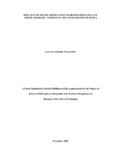Efficacy of Travel Motivation on Destination Loyalty Among Domestic Tourists in the Coast Region of Kenya
Abstract
Despite the marginal growth recorded in the tourism sector in Kenya, the domestic visits and estimates fall far below the expectations. This study aimed at assessing the efficacy of travel motivation on destination loyalty among domestic tourists in the Kenyan Coast. The study was guided by the following specific objective to; determine the travel preferences and frequency of domestic tourists visiting diverse attractions in the Coast Region of Kenya; investigate the influence of travel motivation aspects on destination loyalty of domestic tourists in the Coast Region of Kenya; examine the mediating effect of satisfaction on the relationship between travel motivation and destination loyalty of domestic tourists in the Coast Region of Kenya; and assess the moderating effect of contextual factors on the relationship between travel motivation and destination loyalty among domestic tourists in the Coast Region of Kenya. The study area comprised frequented attractions in the Coast region of Kenya. The study adopted an embedded mixed approach comprising descriptive survey (quantitative) and explanatory research designs (qualitative). Simple random sampling and purposive techniques were adopted for domestic tourists, destination managers and experts respectively. Data was collected using questionnaires and interview schedules. Four hundred (400) questionnaires were distributed and the return rate was 73.3%. Further, 5 destination managers and experts were interviewed. Data analysis was done using various techniques such as; ANOVA, Chi-square, multiple linear regression, hierarchical multiple regressions, Pearson correlations, one sample t-test and descriptive analysis. The research findings were an indication that the majority of the National and Marine Parks within the Coastal touristic circuit are popular among domestic tourists since they were highly visited and revisited due to exceptional experiences on offer. The research findings were an indication that the majority of the museums and historical sites such as; Fort Jesus, Gede ruins and Malindi museum are popular among domestic tourists. These destinations denote the authentic and rich culture among the native people visiting the Coast Region of Kenya. The model summary results indicate that 44.2% of total variation in destination loyalty was explained by travel motivation aspects denoted as destination attributes and sociopsychological factors. The relationship between travel motivation and destination loyalty was mediated by satisfaction (β=0.234, t=07.356, p=<0.000) implying that when customers’ expectations are confirmed they tend to be satisfied and are likely to recommend and revisit. The hierarchical multiple regression demonstrated that contextual factors have a moderating effect on interaction between travel motivation and destination loyalty since the model was significant {R2 = 0.255, F (7, 371) = 12.12, p =0000}. The model accounted for 25.5% of variation on destination loyalty. This means that the composite elements of contextual factors namely; political, economic, technological and socio-cultural factors significantly moderates the interaction between travel motivation and loyalty behaviour of domestic tourists. All the three null hypotheses were tested and rejected. The study recommendations need to; prioritize the ever-growing youth market segment through legislation; creating exceptional tourist experiences and a comparable research studies should be carried out in other destination areas visited by domestic tourists in Kenya.

